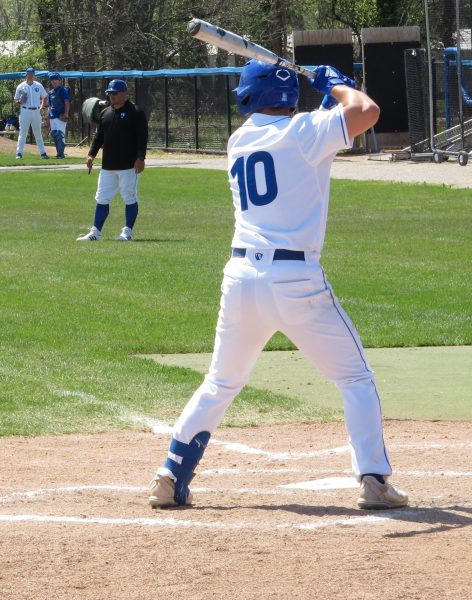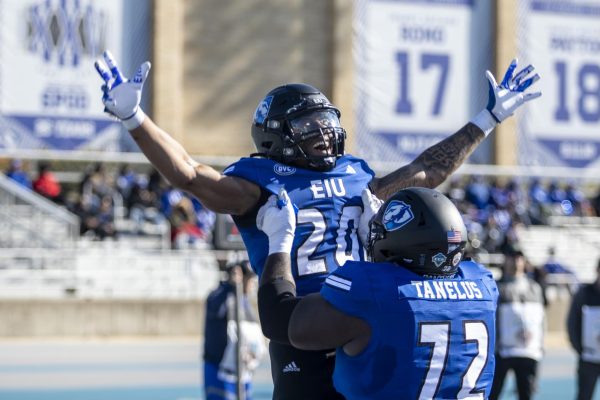Cashing in their ticket
When a coach begins his career, the vision always at the peak of excitement is of his first season as head coach with a program.
Five coaches in the Ohio Valley Conference are living that dream together in 2006. Under different circumstances, Eastern Illinois, Southeast Missouri, Murray State, Tennessee Tech and Tennessee-Martin all have new head coaches this season.
With Eastern Kentucky, Eastern Illinois and Jacksonville State predicted to vie for the championship and the automatic bid into the I-AA playoffs, the new coaches at the lower-tiered teams could change the overall strength of the conference.
“I think the last couple years the problem with the OVC has been depth,” Sports Network I-AA reporter Matt Dougherty said. “Since 2003-2004, there’s been two or three top teams and the middle pack needs to creep in.”
The domino effect started when Tennessee-Martin’s Matt Griffin squad defeated Murray State 49-20 last season and less than one month later, Griffin bolted for Racers’ job.
“The tradition at Murray State is one the major things that brought me here,” Griffin said in his pre-season coaches’ show on Aug. 28. “The campus and everything will make it easier to recruit.”
Murray State has won the conference championship as recently as 2002 but a 2-9 season in 2005 ended the Joe Pannunzio tenure with the Racer program. In the hopes of winning right away, Murray State chose Griffin, who was named a finalist for the 2005 Eddie Robinson Award given to the best I-AA coach of the year. Griffin guided UTM to its first winning season in more than 12 years.
“I think that Matt Griffin has the best opportunity to have consistent success with the school behind him and after recruiting talent to Tennessee-Martin, he’ll find it easier to recruit there,” Dougherty said. “You give him an opportunity for him to recruit freshman and in two years, they’ll be back.”
Murray State (1-2) lost its first Ohio Valley Conference game to Tennessee State but other coaches feel the Racers could make an impact in the 2006 conference race.
“He’s a good, proven coach that can adapt his system to the players he has now at Murray,” said Eastern defensive coordinator Roc Bellantoni. “It will not be UTM football at Murray. He’ll do some things differently.”
Ten days later, UTM replaced Griffin with Tennessee-Chattanooga offensive coordinator Jason Simpson.
“I think the first coaching job you get, it’s usually the program is really down but I’m excited because the cupboard isn’t bear,” Simpson said July 25 on OVC media day.
Simpson got his first I-AA victory of his head-coaching career last week as the Skyhawks (2-1) beat Gardner-Webb 35-9 and have outscored their opponents in the last two games 73-9.
“I think (Tennessee-Martin), while not being a long-term successful program, is the best hope for first-year success,” Dougherty said.
This Saturday, Simpson and his new-look defense will look to pull off the biggest upset of the conference as they host perennial power Jacksonville State.
“If you’ll just look at their teams over time, they’ll come up with an exceptional team at some increment of time,” said Jacksonville State head coach Jack Crowe. “This is truly an exceptional defensive team.”
On the same day as UTM, Southeast Missouri (2-1) gave former New Mexico State head coach Tony Samuel the job after Tim Billings resigned. After eight seasons with the Aggies and compiling a 34-57 career record, Samuel is beginning to learn the differences between lower I-A and I-AA.
“I’ve only played a couple games (and) I’m still learning the I-AA as far as competition,” Samuel said. “It’s one thing seeing kids on film and another seeing them play.”
Under Billings, the Redhawks ran more of a pro-style offense that he made famous as the offensive coordinator at Marshall.
However, Samuel is using a multi-formation collegiate offense that he learned from being an assistant under Purdue’s Joe Tiller last season.
“You’ll see us in one back, two back, three back and no back looks,” Samuel said.
Eastern Illinois (1-2) and Tennessee Tech (0-3) have nearly identical situations as their staffs are trying to run the operation without their head coaches. The Panthers’ Mark Hutson and Golden Eagles’ Doug Malone have been named acting head coaches until a decision can be made with their bosses.
Eastern’s Bob Spoo, who owns the most wins in school and OVC history, has been forced to sit out four to six weeks due to an unspecified surgery.
“It is not the ideal situation but the experience has been more than beneficial,” Hutson said. “I’m just trying to not mess this up until coach Spoo comes back.”
Hutson was named associate head coach before last season while also serving as the offensive coordinator. Under Hutson, the Panthers total offense has gone up from near the bottom in the OVC to 11th in the nation, averaging 416 yards per game.
“As far as making on-the-field decisions for the first time that is different,” Hutson said. “As far as any else, it’s pretty much the same.”
Malone’s situation is a little different as it’s unknown whether or not his predecessor is coming back.
On July 6, 11-year head coach Mike Hennigan resigned and then eight days later changed his mind. Tennessee Tech has rescinded his resignation and placed Hennigan on a medical leave of absence under the Family Medical Leave Act.
Malone has failed to post a win in his first three games and the Golden Eagles have only averaged 11 points per game.
“It’s been exciting to be a head coach but we haven’t done much improving from week to week,” Malone said. “We tried to hit the ground running with this whole thing being put together in mid-July.”
With five new coaches and the OVC having three schools in the Sports Network Top 25, the veteran leaders of the league sees a more balanced conference from top to bottom.
“I think a lot of teams like us lost a bunch of seniors two or three years ago,” Bellantoni said. “I think now that we have rebuilt, we have five teams that can compete in the Gateway (Conference).”
The new coaches are also bringing in innovative philosophies on both sides of the ball to a conference that was primarily known as a grind-it-out running style.
“I think that is a feather in the cap of this conference that they’ve found coaches with different styles because the variety makes it even more difficult to scout,” Malone said.












































